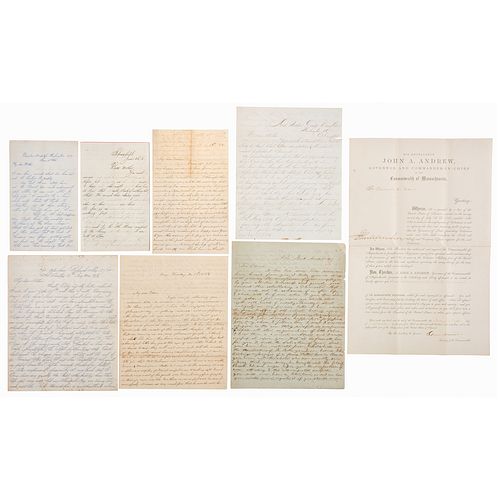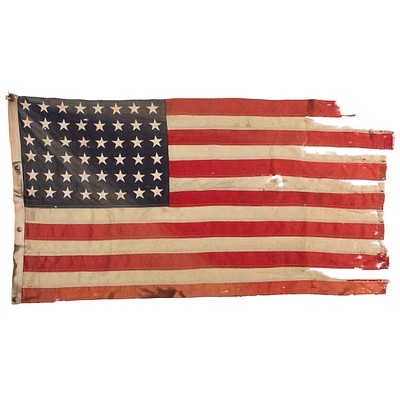Civil War Archive of Edward Horatio Graves, 10th Massachusetts Volunteers
About Seller
6270 Este Ave.
Cincinnati , OH 45232
United States
With offices in Cincinnati, Cleveland and Denver, Cowan’s holds over 40 auctions each year, with annual sales exceeding $16M. We reach buyers around the globe, and take pride in our reputation for integrity, customer service and great results. A full-service house, Cowan’s Auctions specializes in Am...Read more
Two ways to bid:
- Leave a max absentee bid and the platform will bid on your behalf up to your maximum bid during the live auction.
- Bid live during the auction and your bids will be submitted real-time to the auctioneer.
Bid Increments
| Price | Bid Increment |
|---|---|
| $0 | $25 |
| $500 | $50 |
| $1,000 | $100 |
| $2,000 | $250 |
| $5,000 | $500 |
| $10,000 | $1,000 |
| $20,000 | $2,500 |
| $50,000 | $5,000 |
| $100,000 | $10,000 |
About Auction
Jun 26, 2020
Cowan's Auctions is delighted to present the June 26 American Historical Ephemera and Photography Auction, including 55 lots devoted to the African American experience, over 175 lots dating from the Civil War Era, and more than 60 lots documenting life in the American West. Cowan's Auctions dawnie@cowans.com
- Lot Description
Civil War Archive of Edward Horatio Graves, 10th Massachusetts Volunteers
Lot of 24 letters exchanged between Edward Horatio Graves and family members. The archive contains 9 letters written by Graves to his mother, with the remaining letters being written to Graves by family and friends, including his mother (4), his father (1), his siblings Mattie (2) and John (1), and cousin or friend Louise Clark (6).
Edward H. (“Ned”) Graves was a clerk in Brooklyn. Four of these letters date to this pre-war period. One is from his mother, dated Mar. 12, 1857 from Orange (NJ). One is from E.A. Graves, presumably his father (the only brothers mentioned in these letters are John and James), dated Mar. 31, 1857 from New York. Two are from his sister, Mattie, one from Orange (Jan. 13, 1858) and one from East Hampton (Aug. 22, 1859).
By the time the war began, Edward was 22-years-old. He enlisted in one of the early 3-year regiments, which were beginning recruitment when it was apparent that the 100-days units would not be sufficient to end the war. He joined the 10th MA, which was recruited primarily from the Connecticut Valley. He writes his mother on June 26, 1861, less than a week after mustering into Federal Service. [Springfield (3pp, 5” x 8”)]: ”You must excuse my neglect in not writing you before but every day we have been drilled 8 hours and when night comes I have been so tired that I could think of nothing but sleep… I am quartered in what used to be the Barn occupied by the horses at Horse Shows…. Last Friday the 21st inst. we were sworn into the U.S. Service and I suppose I am now a US soldier for the term of 3 years. .. [T]he N. Adams company when their turn came to be sworn in some fifteen backed out and you ought to have seen the rest of the Co. take these poor men and strip their uniform off and drum them out with scarcely no clothing at all on and one man, a kind of ring leader, they shaved half his hair and whiskers off and then drummed him out without any hat…”
In August they were brigaded with the 7th Mass., 2nd Rhode Island and 36th New York under (then) Col. Darius Couch. (Couch would become a Major General by the end of the war.) By Oct. 22, 1861 Graves had already received one promotion. [Head Quarters, Camp Brighton, Washington DC, Oct. 22, 1861 (4pp. approx. 8” x 10”)]: “My present duties are such that at times I am very busy and at others have little or nothing to do… [I] have been for nearly two weeks the Quarter Master Sergeant so you may direct your letters that way to save some trouble…
“We heard last night of the fight at Leesburg… It seems a shame to lose almost every engagement at this particular junction when England is only waiting for these reverses to acknowledge the Rebels…
“I have been unusually healthy but we have been quite sickly here having had the Typhoid Fever and about ten have died. We have a very healthy location but we are not helped with good physicians.”
In the spring, the regiment joined McClellan’s Peninsula Campaign. On May 18, 1862 Edward writes his mother: [20 miles from Richmond (4pp, 8 x 10”)]: “…Our Brigade was ordered to be temporarily detached from the Division to the support of Gen. Davidson’s Brigade on the advance and we were camped but ¾th of a mile from the Rebel entrenchments in front of Yorktown…. I went over to the scene of the engagements and climbed a tree and could plainly see the Rebel fortifications and could distinguish the Negros from the whites with the aid of a common spy glass. I was soon compelled to relinquish my point of observation by the ominous sound of a bullet in rather unpleasant proximity to my head and I came down very quickly.“ In reference to the camp, he writes: “You cannot have any idea of the quantity of mud that a little rain produces in the land of Va.” (Unfortunately, Burnside would find out about Virginia mud the following January.)
They were then ordered to move to within four miles of Williamsburgh. “…Our Regiment was then ordered to the support of Gen. Hancock whose brilliant conduct has been the subject of all the newspaper correspondents and among Army officers. Our Regiment arrived there just as the Battery was taken after a double quick march of 2 miles thru mud rain woods and ravines and was immediately ordered to the front and then out as skirmishers on the field where the battle had been raging and all around there lay the dead and wounded this new sight to our boys affected them somewhat… all this time I was with the baggage train.”
They were camped at Harrison’s Landing after losing heavily at Fair Oaks and Malvern Hill. [In camp near Harrison Landing, Va., Aug. 3, 1862 (4pp, 6.5 x 8”)] “You cannot imagine the amount of confidence that is placed in Gen. McClellan by the soldiers and officers and the joint indignation manifested at the slow progress of enlistment at the north….” In reference to paying bounties to have someone else serve for you: “They ought not to be bought but forced [to serve] if the country cannot be saved in any other way.”
Edward became ill just a couple weeks after this. His letter of Aug. 26, 1862 was written “In camp near Yorktown / In the Regimental Hospital” (3pp, 8” x 10”). He is not specific about symptoms, but notes that during the retreat from Harrison’s Landing he had to dismount from his horse, being too weak to remain astride, and ride in the baggage train back to Williamsburg. This had other consequences, as he related to his mother in his letter of Sept. 10, 1862 [Washington (3pp, 7.5 x 9.75”)], he was unable to send her any money this month because he had to buy all of his food while in the hospital. “I could eat nothing that the government furnish[ed].” He was trying to rejoin his unit, but the Surgeon would not clear him to return. He was paying attention to war news: “…watching Stonewall Jackson with a great deal of interest he seems to be almost invincible but give our little Mac a fair chance.”
They left Harrison’s Landing at the end of summer and in mid-month were headed toward Antietam, but arrived too late for the battle. He wrote his mother from a “Camp near Williamsport, Md. on Sept 26, 1862” (4pp, 5 x 8”) then went into winter quarters. Spring found them back in Virginia [In camp near Falmouth, Va. (3pp, 8” x 10”)]: “…We number now about 250 muskets, many good men have fallen, 10 killed out right and the balance of our loss we shall not probably see for 6 months. Many of them will get their discharge. Some of the wounded that we have heard from had either a leg or arm amputated.”
He then makes reference to battles being won more by the effort invested than by the numbers of men in each army. “Take our Regiment… when the Rebs had driven Brooks Division from the field and the men running in every direction, our own men by a well directed fire stopped the Rebs from pursuing them and finally drove them in all directions. This was twice our numbers. We evidently took them by surprise.”
The Regiment fought at Fredericksburg before going into winter quarters between Falmouth and White Oak Church. In May it was still near Fredericksburg, fought at Chancellorsville where it assisted in the capture of Marye’s Heights and Salem Heights. It joined the 6th Corps in May and fought with this unit at Gettysburg. During the summer it fought at Rappahannock Station and Mine Run. In May 1864 it was engaged in the Wilderness where it suffered heavy losses. Edward was wounded on May 5 during this campaign. He was immediately transported to Washington, DC with its better medical facilities.
The lot includes Graves’ appointment to 1st Lieutenant in the 10th Regiment, 23 Sept. 1863, signed by John A. Andrew as Governor of Massachusetts (10.5 x 16” on heavy paper).
There are a number of letters from various women in Edward’s orbit. The next letter from him is from Douglas Hospital, Washington, DC, June 21, 1864. He was not improving much and trying to figure out how to get home. His sister, Mattie, had been ill, so he tells her (jokingly) she has to get well because he is coming home to be the invalid and their mother can’t handle both. His unit, (those who did not veteranize) himself with it, was discharged in two groups during the first week of July and he did eventually make his way back to East Hampton.Variable. Several have been repaired with cellophane tape. A number are nearly too light to read (partly as written). Seven letters are accompanied by transcriptions.Condition
- Shipping Info
-
Buyers are required to pay for all packing, shipping and insurance charges. Overseas duty charges are the responsibility of the successful Bidder. Be aware that for larger and/or valuable items, shipping charges can be substantial. - If there is no shipping amount on listed your invoice, you will need to make arrangements to pick up or ship your purchase through an alternative shipping company. Our shipping department can be contacted at 513.871.1670 (ext. 219) or email shipping@cowans.com. - Shipping charges include insurance for your order while in transit. If you have private insurance we will adjust your charge to include only packing and shipping. - Please allow 14 – 21 days after payment to package and ship your purchase as carefully as possible.
-
- Buyer's Premium



 EUR
EUR CAD
CAD AUD
AUD GBP
GBP MXN
MXN HKD
HKD CNY
CNY MYR
MYR SEK
SEK SGD
SGD CHF
CHF THB
THB











